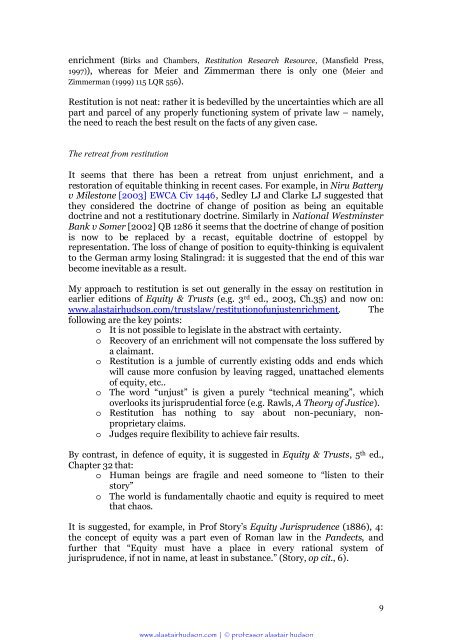England's dreaming equity, trust and conscience - alastairhudson.com
England's dreaming equity, trust and conscience - alastairhudson.com
England's dreaming equity, trust and conscience - alastairhudson.com
Create successful ePaper yourself
Turn your PDF publications into a flip-book with our unique Google optimized e-Paper software.
enrichment (Birks <strong>and</strong> Chambers,Restitution Research Resource, (Mansfield Press,1997)), whereas for Meier <strong>and</strong> Zimmerman there is only one (Meier <strong>and</strong>Zimmerman (1999) 115 LQR 556).Restitution is not neat: rather it is bedevilled by the uncertainties which are allpart <strong>and</strong> parcel of any properly functioning system of private law – namely,the need to reach the best result on the facts of any given case.The retreat from restitutionIt seems that there has been a retreat from unjust enrichment, <strong>and</strong> arestoration of equitable thinking in recent cases. For example, in Niru Batteryv Milestone [2003] EWCA Civ 1446, Sedley LJ <strong>and</strong> Clarke LJ suggested thatthey considered the doctrine of change of position as being an equitabledoctrine <strong>and</strong> not a restitutionary doctrine. Similarly in National WestminsterBank v Somer [2002] QB 1286 it seems that the doctrine of change of positionis now to be replaced by a recast, equitable doctrine of estoppel byrepresentation. The loss of change of position to <strong>equity</strong>-thinking is equivalentto the German army losing Stalingrad: it is suggested that the end of this warbe<strong>com</strong>e inevitable as a result.My approach to restitution is set out generally in the essay on restitution inearlier editions of Equity & Trusts (e.g. 3 rd ed., 2003, Ch.35) <strong>and</strong> now on:www.<strong>alastairhudson</strong>.<strong>com</strong>/<strong>trust</strong>slaw/restitutionofunjustenrichment. Thefollowing are the key points:o It is not possible to legislate in the abstract with certainty.o Recovery of an enrichment will not <strong>com</strong>pensate the loss suffered bya claimant.o Restitution is a jumble of currently existing odds <strong>and</strong> ends whichwill cause more confusion by leaving ragged, unattached elementsof <strong>equity</strong>, etc..o The word “unjust” is given a purely “technical meaning”, whichoverlooks its jurisprudential force (e.g. Rawls, A Theory of Justice).o Restitution has nothing to say about non-pecuniary, nonproprietaryclaims.o Judges require flexibility to achieve fair results.By contrast, in defence of <strong>equity</strong>, it is suggested in Equity & Trusts, 5 th ed.,Chapter 32 that:o Human beings are fragile <strong>and</strong> need someone to “listen to theirstory”o The world is fundamentally chaotic <strong>and</strong> <strong>equity</strong> is required to meetthat chaos.It is suggested, for example, in Prof Story’s Equity Jurisprudence (1886), 4:the concept of <strong>equity</strong> was a part even of Roman law in the P<strong>and</strong>ects, <strong>and</strong>further that “Equity must have a place in every rational system ofjurisprudence, if not in name, at least in substance.” (Story, op cit., 6).9www.<strong>alastairhudson</strong>.<strong>com</strong> | © professor alastair hudson













